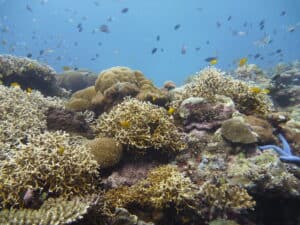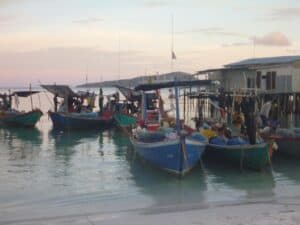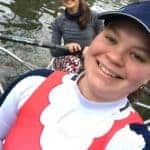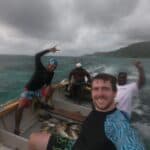Profile
Mark Hamilton
-
About Me:
I am a student at Lancaster University and am interested in coral reefs and fisheries. I have always loved nature, especially sea life.
-
Read more
I grew up in the south of Scotland. I have also lived in Aberdeen, the Shetland Islands (the most northerly part of the UK!) and now Lancaster. I enjoy baking, gardening and playing computer games.
-
My pronouns are:
he/him
-
My Work:
I study how unhealthy coral reefs change the kind of fish that live there and what this means for people who want to eat them!
-
Read more
Corals are animals that have tiny plants in their bodies to help them get food to survive (a bit like how bacteria in your gut help you). They are closely related to other animals like sea anemones and jellyfish. They come in lots of different shapes, colours and sizes.
When seawater gets too warm, corals get stressed and lose their little plant friends making it harder for them to live. They also lose their colour when this happens and turn bright white (this is called “coral bleaching”, because the coral look like they have been bleached). When this happens to lots of corals at the same time, the whole coral reef is changed and lots of fish that need corals to eat and live inside are no longer safe.
Here are two different types of coral. The first is a healthy coral (with a yellow fish living in it!) and the second is a bleached coral (it has gone almost completely white):


A lot of people around the world eat fish that they catch on coral reefs. So it’s important that coral reefs stay healthy as the world gets warmer, to keep corals, fish and people happy!
In my job, I study how different kinds of fish deal with unhealthy coral reefs. When coral dies, lots of seaweed quickly grows in its place, and some fish like to eat this – so those fish are OK. Fish that need coral for food and a home are not OK.
I also study how people living near coral reefs deal with changing reef health. Do they have to catch different kinds of fish when the reef changes? Do they have to travel further in their boats to get the fish they want to catch? Are they eating less fish and eating different kinds of food instead?
To do my job, I have to go underwater to see the coral and fish. I do this using SCUBA gear (which means “Self-Contained Underwater Breathing Apparatus” – in other words it’s a fancy invention that lets people breathe underwater!).
Here’s me after a fun dive with a friend:

-
My Typical Day:
At the moment lots of my work is on my computer! I am looking at information that other people in my team have collected, in countries like the Seychelles and French Polynesia.
One day, I will go to these places and SCUBA dive on the coral reefs to count fish and corals. I will also work with fishers (people whose job is to catch fish) and ask them questions about what fish they catch, where they catch them and how they catch them. I hope to go to the tropics to do this next year.
-
Read more
When I am diving, a healthy reef looks like this:

You can see lots of healthy coral with spaces in between for fish to hide in. There are also lots of colourful fish, and you can see a blue starfish on the right. I count the fish and see how much coral and seaweed there is on the reefs.
When I am speaking to fishers, I need to find them first! Often they are out at sea in their boats, but often come back to shore to sell all the fish they have caught. Here are some fishing boats I saw in Cambodia:

They are a lot smaller than the fishing boats here in the UK. If they can, the fishers will take some time to answer the questions I have for them, about how damage on coral reefs has changed how they catch fish.
After I have all of the information I need from these tropical countries, I come back to Lancaster and spend a lot of time trying to see if I have discovered anything new. Then I write all about it so others can read my findings.
-
What I'd do with the prize money:
I would use the money to create educational displays at local public events, like nature festivals or open days at Lancaster University.
-
Education:
Primary school: Applegarth (Lockerbie, Scotland)
Secondary school: Lockerbie Academy (Scotland)
|
University:
University of Aberdeen;
Lancaster University -
Qualifications:
Secondary school (Scottish grade system):
2008:
Biology (Advanced Higher);
Geography (Advanced Higher);
Spanish (Intermediate I);
|2007 (all Higher):
Biology;
Chemistry;
English;
Geography;
Maths;
|2006:
Standard Grades:
Biology;
Chemistry;
English;
Geography;
German;
Maths;
Intermediate II:
Art and Design;
Home Economics;Secondary school was where my interest in science really developed. Geography was really interesting and taught me a lot about natural landscapes and also about human societies around the globe. Home Economics and cookery were also very useful when I was cooking my own meals at university!
|
University:University of Aberdeen:
Batchelor of Science (Hons.) in Marine Biology;
Master of Research in Applied Marine and Fisheries Ecology;
-The experience I gained in both of these degrees (e.g. field work and data analysis skills) was very important for getting a job in fisheries research in Shetland and my current PhD postion. ;Lancaster University:
PhD: “Implications of coral reef degradation for fisheries” -
Work History:
– 2006-2007: Kitchen Porter;
– 2008-2009: Outdoor Staff at an animal petting zoo;
– 2010 & 2012: Branch Assistant at a wholesaler;
– 2013-2019: Fisheries Research Assistant at NAFC Marine Centre (Shetland) -
Current Job:
Research Assistant at Lancaster University, looking into the importance for marine fisheries for people’s health.
-
Employer:

-
My Interview
-
How would you describe yourself in 3 words?
SCUBA-diving fish researcher
What did you want to be after you left school?
Marine biologist!
Were you ever in trouble at school?
No (nothing serious, anyway!)
Who is your favourite singer or band?
Lady Gaga
What's your favourite food?
Pizza
If you had 3 wishes for yourself what would they be? - be honest!
1) Be able to transport anywhere, instantly; 2) Be able to breathe underwater; 3) Be able to speak any language in the world... (all of these would be very useful in my job!)
Tell us a joke.
How do you get Pikachu on a bus? Pokémon
-







